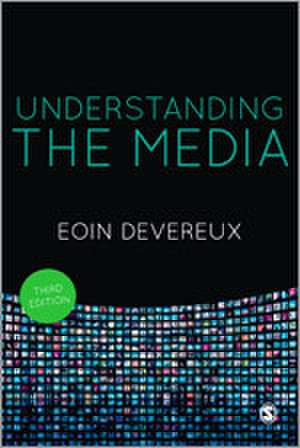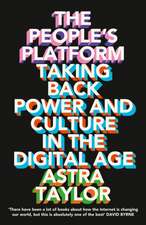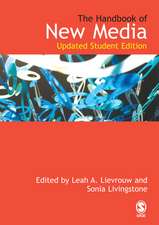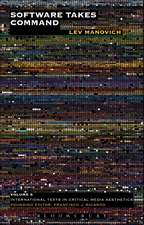Understanding the Media
Autor Eoin Devereuxen Limba Engleză Mixed media product – 12 oct 2020
- Chindu Sreedharan, Bournemouth University
"Has expanded the possibilities of what a textbook can be. Incisive questions framed through accessible and detailed examples provide a platform for a wealth of different activities that engage readers in the critical study of media."
- Dr Daniel Ashton, Bath Spa University
"Accessibly written and very well-structured, the book will be one of those you go back to time and time again throughout your studies. In addition it also offers that much-needed, little-found extra in a textbook: critical engagement with media and society. A joy for those of us teaching the subject.
- Joke Hermes, University of Amsterdam
How much of our media experience is shaped by the profit motive of media conglomerates? How much freedom and power do we have as members of an increasingly fragmented media audience? How do the media influence what we understand about friendship, globalization and even our own selves?
This book teaches students how to ask critical questions of the media, and gives them the analytical tools to answer those questions. By gaining a rich understanding of how the media play a role in society, both in giving pleasures and creating power relationships, students are encouraged to become critical thinkers. Understanding the Media:
- Teaches the theoretical foundations and key concepts students need to get started on their own media studies
- Brings concepts to life with examples and case studies on everything from Harry Potter and Big Brother to the Occupy movement
- Shows the ‘how to’ with guided exercises and improves essay writing with a guide to the research literature
- Helps students take learning further with guided free online readings
Companion Website now available! Visit www.sagepub.co.uk/devereux3e for a range of student and lecturer resources.
| Toate formatele și edițiile | Preț | Express |
|---|---|---|
| Paperback (1) | 344.54 lei 3-5 săpt. | +33.13 lei 7-13 zile |
| SAGE Publications – 9 dec 2013 | 344.54 lei 3-5 săpt. | +33.13 lei 7-13 zile |
| Mixed media product (1) | 250.19 lei 3-5 săpt. | +13.19 lei 7-13 zile |
| SAGE Publications – 12 oct 2020 | 250.19 lei 3-5 săpt. | +13.19 lei 7-13 zile |
Preț: 250.19 lei
Nou
Puncte Express: 375
Preț estimativ în valută:
47.90€ • 49.79$ • 39.71£
47.90€ • 49.79$ • 39.71£
Carte disponibilă
Livrare economică 15-29 ianuarie 25
Livrare express 01-07 ianuarie 25 pentru 23.18 lei
Preluare comenzi: 021 569.72.76
Specificații
ISBN-13: 9781529760989
ISBN-10: 1529760984
Pagini: 352
Dimensiuni: 233 x 189 x 24 mm
Greutate: 0 kg
Ediția:Third Edition
Editura: SAGE Publications
Colecția Sage Publications Ltd
Locul publicării:London, United Kingdom
ISBN-10: 1529760984
Pagini: 352
Dimensiuni: 233 x 189 x 24 mm
Greutate: 0 kg
Ediția:Third Edition
Editura: SAGE Publications
Colecția Sage Publications Ltd
Locul publicării:London, United Kingdom
Recenzii
Devereux’s third edition of Understanding the Media has expanded the possibilities of what a textbook can be. Incisive questions framed through accessible and detailed examples provide a platform for a wealth of different activities that engage readers in the critical study of media.
This is a lucid and lively introduction to key concepts and developments in media and media studies. The new edition, with updated case studies and a good range of online reading, is a valuable resource for both students and lecturers.
Understanding the Media is carefully aimed at a new generation of media students. Accessibly written and very well-structured, the book will be one of those you go back to time and time again throughout your studies. In addition it also offers that much-needed, little-found extra in a textbook: critical engagement with media and society. A joy for those of us teaching the subject.
This is a lucid and lively introduction to key concepts and developments in media and media studies. The new edition, with updated case studies and a good range of online reading, is a valuable resource for both students and lecturers.
Understanding the Media is carefully aimed at a new generation of media students. Accessibly written and very well-structured, the book will be one of those you go back to time and time again throughout your studies. In addition it also offers that much-needed, little-found extra in a textbook: critical engagement with media and society. A joy for those of us teaching the subject.
Cuprins
Introduction: Asking Awkward Questions
Chapter 1: Understanding the Media
Introduction
Defining the Media
The Media in a Social Context
Asking Questions about U2
Asking Questions? Which Questions?
The Importance of Theory and Method
Conclusion
Chapter 2: Media Histories, Media Power
Introduction
Media Histories
Changing Media Histories: an Irish Example
A Contested Field
Media and Power
Power and Media Content
Power and the Media Industries
Power and Media Audiences
Towards a (More) Critical Media Studies
Model of Media Analysis: Production, Content and Reception
Conclusion
Chapter 3: Media Globalization
Introduction
What is Globalisation?
The Latest Brand of Colonialism?
Theories of Globalisation
Media Globalisation
Conclusion
Chapter 4: Media Ownership: Concentration, Conglomeration and Regulation
Introduction
Why Should We be Bothered about Media Ownership?
Media Ownership
Conglomeration, Concentration and Content
Vertical and Horizontal Integration
The Political Economy Perspective
'Follow the money...'
Jurgen Habermas and the Public Sphere
Media and Regulation
Models of Media Regulation
So, Do We Need Media Regulation?
Conclusion
Chapter 5: Media Professionals and Media Production
Introduction
Production Research
Two Traditions
Theoretical Underpinnings of Production Research
Methodological Basis
Hall's Encoding/ Decoding Model
Ethnographic Research on Media Production and Media Professionals
Inside Prime Time by Todd Gitlin
Conclusion
Chapter 6: Media, Ideology and Discourse
Introduction
What Precisely is Meant by the Term Ideology?
Defining Ideology
Ideology as Dominant Ideology
Discourse and Ideology
It's All in the Discourse?
Conclusion
Chapter 7: Media 'Re-presentations' in an Unequal World
Introduction
Representation/ Re-representation and 'Reality'
What is Content Analysis?
Media Re-representations in a Divided World: Four Approaches Outlined
Media Re-presentations of Social Class
Media Coverage of the Underclass: Stories about Welfare
The Happy Poor: Representations in Fictional Media Content
Media Representations of Ethnicity: a Discourse Analysis Approach
Media Representations of Gender and Sexuality
Conclusion
Chapter 8: Media Audiences and Reception
Introduction
Themes and Tensions: Competing Theoretical and Methodological Approaches in Audience Research
Power to the People? Three Phases in Reception Research
Reception Analysis and the 'Ethnographic Turn'
Qualitative Audience Research: Three Examples
Audiences, Fans and Participatory Cultures
Conclusion
Chapter 9: New Media, Social Media
Introduction: New Media and Social Media - Empowering Audiences, But Who is Holding the Tiger's Tail?
Will the Revolution be Digitalized?
The Promise and the Reality of the Internet
We are All 'Produsers' Now, are We? Audiences and New Media
Conclusion
Chapter 10: Conclusion: The 'How' and 'Why' of Media Analysis
Introduction: This is Not a Methods Chapter...
A Step-by-Step Approach to Doing Media Research
How to Usefully Engage with Existing Research
Doing Production, Content and Reception Research
Keep on Asking Awkward Questions...
Conclusion: The 'How' and 'Why' of Media Analysis
Chapter 1: Understanding the Media
Introduction
Defining the Media
The Media in a Social Context
Asking Questions about U2
Asking Questions? Which Questions?
The Importance of Theory and Method
Conclusion
Chapter 2: Media Histories, Media Power
Introduction
Media Histories
Changing Media Histories: an Irish Example
A Contested Field
Media and Power
Power and Media Content
Power and the Media Industries
Power and Media Audiences
Towards a (More) Critical Media Studies
Model of Media Analysis: Production, Content and Reception
Conclusion
Chapter 3: Media Globalization
Introduction
What is Globalisation?
The Latest Brand of Colonialism?
Theories of Globalisation
Media Globalisation
Conclusion
Chapter 4: Media Ownership: Concentration, Conglomeration and Regulation
Introduction
Why Should We be Bothered about Media Ownership?
Media Ownership
Conglomeration, Concentration and Content
Vertical and Horizontal Integration
The Political Economy Perspective
'Follow the money...'
Jurgen Habermas and the Public Sphere
Media and Regulation
Models of Media Regulation
So, Do We Need Media Regulation?
Conclusion
Chapter 5: Media Professionals and Media Production
Introduction
Production Research
Two Traditions
Theoretical Underpinnings of Production Research
Methodological Basis
Hall's Encoding/ Decoding Model
Ethnographic Research on Media Production and Media Professionals
Inside Prime Time by Todd Gitlin
Conclusion
Chapter 6: Media, Ideology and Discourse
Introduction
What Precisely is Meant by the Term Ideology?
Defining Ideology
Ideology as Dominant Ideology
Discourse and Ideology
It's All in the Discourse?
Conclusion
Chapter 7: Media 'Re-presentations' in an Unequal World
Introduction
Representation/ Re-representation and 'Reality'
What is Content Analysis?
Media Re-representations in a Divided World: Four Approaches Outlined
Media Re-presentations of Social Class
Media Coverage of the Underclass: Stories about Welfare
The Happy Poor: Representations in Fictional Media Content
Media Representations of Ethnicity: a Discourse Analysis Approach
Media Representations of Gender and Sexuality
Conclusion
Chapter 8: Media Audiences and Reception
Introduction
Themes and Tensions: Competing Theoretical and Methodological Approaches in Audience Research
Power to the People? Three Phases in Reception Research
Reception Analysis and the 'Ethnographic Turn'
Qualitative Audience Research: Three Examples
Audiences, Fans and Participatory Cultures
Conclusion
Chapter 9: New Media, Social Media
Introduction: New Media and Social Media - Empowering Audiences, But Who is Holding the Tiger's Tail?
Will the Revolution be Digitalized?
The Promise and the Reality of the Internet
We are All 'Produsers' Now, are We? Audiences and New Media
Conclusion
Chapter 10: Conclusion: The 'How' and 'Why' of Media Analysis
Introduction: This is Not a Methods Chapter...
A Step-by-Step Approach to Doing Media Research
How to Usefully Engage with Existing Research
Doing Production, Content and Reception Research
Keep on Asking Awkward Questions...
Conclusion: The 'How' and 'Why' of Media Analysis
Descriere
"Accessibly written and very well-structured, the book will be one of those you go back to time and time again throughout your studies. In addition it also offers that much-needed, little-found extra in a textbook: critical engagement with media and society. A joy for those of us teaching the subject" - Joke Hermes, University of Amsterdam











